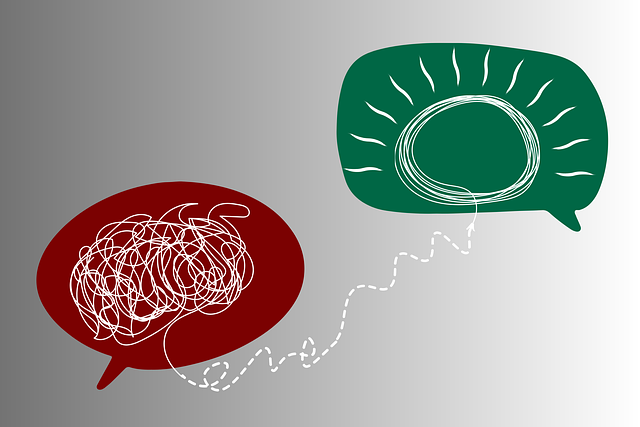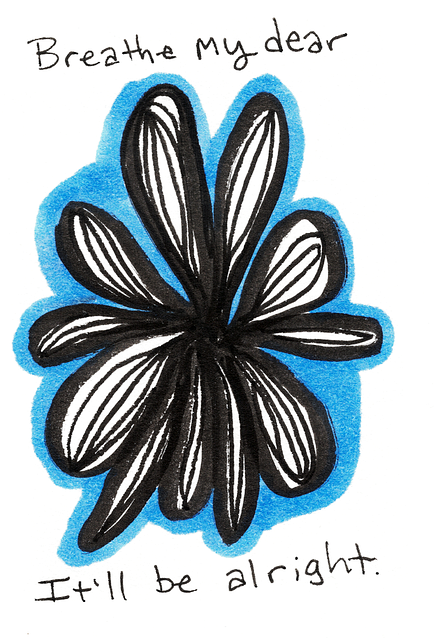Navigating a mental illness diagnosis, especially depression, anxiety, or alcohol abuse, can be challenging for young adults during life transitions. Understanding these conditions as neurochemical imbalances and embracing therapy as a sign of strength is crucial for recovery. Evidence-based therapies like Cognitive Behavioral Therapy (CBT) and Motivational Interviewing (MI), combined with stress management workshops and positive mindset practices, help gain insights, develop coping mechanisms, and enhance well-being. Specialized care for alcohol abuse addresses self-medication cycles through empathy, craving management, and mindfulness exercises. Support groups facilitated by mental health organizations reduce feelings of isolation. Continuous care, including tailored therapy, public awareness campaigns, and mindfulness meditation, is essential for long-term mental health and wellness among young adults dealing with alcohol abuse.
Mental illness diagnosis and treatment can be overwhelming, especially for young adults. This article offers a comprehensive guide to navigating this complex landscape, focusing on perspectives often overlooked. We explore the unique challenges faced by young adults, delving into topics like understanding mental health diagnoses, the interplay of alcohol abuse, effective therapy options, building supportive networks, and long-term management strategies to prevent relapse. By providing practical insights, we aim to empower individuals on their path to recovery and well-being.
- Understanding Mental Illness Diagnoses: A Young Adult's Perspective
- The Role of Alcohol Abuse in Mental Health Treatment
- Navigating Therapy Options for Effective Recovery
- Building a Support System: Peer Connections and Professional Help
- Long-Term Management and Preventing Relapse
Understanding Mental Illness Diagnoses: A Young Adult's Perspective

Navigating a mental illness diagnosis can be overwhelming, especially for young adults who are often in the midst of crucial life transitions. Understanding your diagnosis is the first step towards healing and recovery. This involves recognizing that mental health conditions like depression, anxiety, or even alcohol abuse aren’t personal failures but complex neurochemical imbalances that can be treated effectively with professional help. Many young adults might feel stigmatized, but seeking therapy is a sign of strength and self-care.
Therapy offers valuable tools for managing stress, cultivating positive thinking, and boosting confidence. Organizations dedicated to mental health support often provide spaces where young adults can connect with peers facing similar challenges, reducing feelings of isolation. By combining evidence-based therapies with stress management workshops and positive mindset practices, individuals can gain insights into their conditions, develop coping strategies, and embark on a journey towards improved well-being and a brighter future.
The Role of Alcohol Abuse in Mental Health Treatment

Alcohol abuse often co-occurs with mental health disorders, complicating the diagnostic and treatment process. For young adults seeking therapy, addressing alcohol abuse is a crucial step in their mental health journey. The interplay between these two issues requires specialized care. Many individuals use alcohol as a coping mechanism for underlying anxiety or depression, creating a vicious cycle that exacerbates both conditions.
Effective treatment involves building empathy and understanding within the therapeutic space. Therapists can employ strategies to help clients manage cravings and develop healthier self-care routines. By incorporating activities that foster emotional well-being, such as mindfulness exercises, clients can reduce reliance on alcohol. This holistic approach not only assists in anxiety relief but also empowers young adults to navigate their mental health challenges with resilience.
Navigating Therapy Options for Effective Recovery

Navigating therapy options is a crucial step for young adults seeking recovery from alcohol abuse. With various therapeutic approaches available, finding the right fit can be overwhelming. Cognitive Behavioral Therapy (CBT) and Motivational Interviewing (MI) are evidence-based methods proven effective in treating substance use disorders. CBT equips individuals with coping strategies by identifying and changing negative thought patterns and behaviors associated with alcohol abuse. MI, on the other hand, enhances motivation for behavior change and self-efficacy.
Integrating these therapies with specialized services tailored to young adults’ unique needs can significantly contribute to successful recovery. Healthcare provider cultural competency training and risk assessment tools are essential components in this process. By understanding the patient’s cultural background and personal risks, mental health professionals can offer personalized treatment plans that address specific challenges. Effective therapy for young adults with alcohol abuse involves a combination of evidence-based practices, tailored interventions, and a supportive environment fostering long-term recovery.
Building a Support System: Peer Connections and Professional Help

Building a strong support system is pivotal for anyone navigating mental illness, especially young adults. Peer connections offer a unique advantage through shared experiences and understanding, fostering a sense of belonging and reducing feelings of isolation. Support groups, both online and offline, provide safe spaces to express struggles, learn resilience-building strategies, and exchange coping mechanisms. These connections can be incredibly powerful in encouraging adherence to treatment plans and promoting overall well-being.
Professional help remains an integral component of effective support. Therapists and mental health professionals play a vital role in assisting individuals with diagnosis and treatment options. They provide evidence-based therapy, such as cognitive-behavioral therapy (CBT), which has proven successful in managing various conditions, including alcohol abuse among young adults. Additionally, these professionals offer risk assessments to identify potential hazards and develop tailored communication strategies to ensure the best care and support for each individual’s unique needs.
Long-Term Management and Preventing Relapse

Mental health is a marathon, not a sprint, and effective long-term management is crucial to preventing relapse. For young adults struggling with issues like alcohol abuse, continuous care is essential to sustaining recovery. Therapy plays a pivotal role here, offering strategies tailored to individual needs. Cognitive Behavioral Therapy (CBT), for instance, equips individuals with tools to identify and change negative thought patterns and behaviors, promoting healthier coping mechanisms.
Beyond therapy, public awareness campaigns focused on emotional well-being promotion techniques can significantly contribute to relapse prevention. Mindfulness meditation, as a complementary practice, has shown promise in reducing stress, improving focus, and fostering resilience. By integrating these practices into daily routines, young adults can enhance their emotional intelligence, better manage triggers, and maintain a sense of balance, all vital components in the journey towards long-term mental health and wellness.
Mental illness diagnosis and treatment can be a complex journey, especially for young adults navigating alcohol abuse. Understanding one’s condition, seeking professional help, and building a robust support system are key to effective recovery. By exploring various therapy options tailored to their needs, young adults can foster resilience and manage their mental health successfully in the long term. This comprehensive approach, combined with strategies to prevent relapse, empowers individuals to take control of their well-being and live fulfilling lives.














